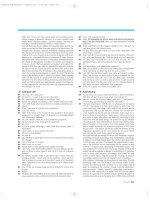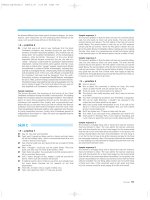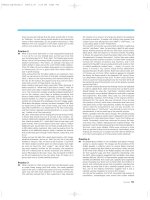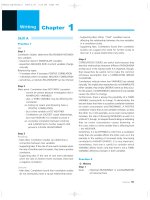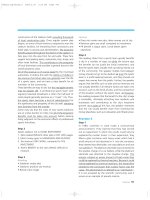Tài liệu Mastering skills for the toefl ibt part 1 docx
Bạn đang xem bản rút gọn của tài liệu. Xem và tải ngay bản đầy đủ của tài liệu tại đây (477.69 KB, 10 trang )
Beginning READING
Mastering Skills for the TOEFL
®
iBT
TRANSCRIPTS
Listening Section / Speaking Section / Writing Section / Practice Test
Mastering-Books_5 2006.5.29 2:12 PM Page 693
Listening
694
Transcripts
C
hapter
1
Skill A
01 Campus Life
W: Hey, I saw you guys playing softball. Could I join your team?
M: Well, we’re full right now actually. Are you signed up in the
intramural sports league?
W: No, how does that work?
M: Go to Withurst Hall room 304 and fill out a form to sign up as
a free agent. Then, if a team needs a player, they can select you
from a list. You just have to sign up and pay the fees.
W: Fees, huh? What are those like?
M: Well, they’re 30 dollars per player for a season if you’re on a
team. I’m not sure about free agents.
02 Sociology
M: Could you explain the differences between preindustrial, early
industrial, and mature industrial populations again?
W: Of course. A preindustrial population, like say, a tribe, has a
high death rate and a high birth rate. Many people die, but
many new babies are born, too. So, their population is stable.
A mature industrial population, such as the US, has low birth
and death rates, so the population is also stable in theory. On
the other hand, an early industrial population, like India, can
achieve low death rates but still have high birth rates, so it
experiences a population explosion. Thus, it differs from the
other two.
03 Literature
M: I noticed that many of you wrote in your term papers that
Shakespeare invented the sonnet. This is a fallacy. Shakespeare
did popularize the sonnet in England, but it had been in existence
in Italy for two centuries before that. Sonnets were being written
in Italian as pastoral love poems. If you recall from earlier lectures,
it was Petrarch who refined the form and set the standard for
the Italian sonnet, with two parts, the first part being eight lines
and the second part six lines. Shakespearean sonnets, on the
other hand, have four parts: three quatrains, or four-line parts,
and one couplet, or two-line part.
04 Campus Life
M: What can I do for you?
W: I really wanted to take Chemistry 221 with you, but the class is
full.
M: Is it a required course for you?
W: Yes, it is. I’m majoring in chemistry.
M: I presume you have the prerequisites, then?
W: Prerequisites?
M: Prerequisites are those courses that you need to have completed
in order to enroll in any given class. The prerequisite for Chemistry
221 is Chemistry 100.
W: Oh, yes of course.
M: In that case, you can enroll in the class.
W: But the class is full. Don’t I have to put my name on a waiting
list or anything?
M: No, not for required courses. Anyone who needs to take a class
to fulfill their course requirements is permitted to enter.
05Geology
W: The two main types of glacial erosion are plucking and abrasion.
Plucking occurs when blocks of rock are pulled away from the
bedrock. The glacier works like a backhoe. Water flows into cracks
in the rock. It then refreezes and expands, causing the chunk of
rock to separate from the bedrock. A glacier can then pick up
these loose chunks as it passes over the bedrock. This process
creates a lot of loose debris, which causes abrasion. Now, abrasion
works like sandpaper with the debris grinding away at the
bedrock. If the debris is coarse, it will create long grooves in the
bedrock called striations. On the other hand, if the debris is fine,
it will create a smooth surface.
06 Health Science
M: One commonly pasteurized product is milk. By decreasing the
amount of dangerous bacteria present, milk can be made safer
to consume. It also lasts longer after it’s been pasteurized. The
most common pasteurization procedure is high temperature/short
time (HTST) pasteurization. The milk is kept at 72º Celsius for at
least 15 seconds. That is the high temperature --- 72 degrees ---
for a short time --- 15 seconds. This allows the milk to remain
fresh for two or three weeks if refrigerated. For longer-lasting
milk, the ultra high temperature (UHT) method is used. This
milk is heated to 138º Celsius and held there for only two
seconds. Milk pasteurized under the UHT method can remain
fresh for up to two or three months.
07 Campus Life
M: Hey Josie! You assessed Peter’s presentation didn’t you?
W: Yep. I thought he did pretty well.
M: Me, too. How did you actually fill out the assessment form?
W: Well, I noted down the main ideas, the strengths, and then one
thing that could be improved, like how Peter was chewing gum
during the presentation.
M: (Laughs) OK. That’s it?
W: No, then I graded him on several areas from 1 to 4, 4 being the
best. Like, I gave Peter a 4 for eye contact because he didn’t look
at the floor at all.
M: I see. You know, I asked because I’m assessing you next Thursday.
08Journalism
W: The scholarly method involves careful analysis and interpretation
of information. Information must come from somewhere. These
are the sources. There are three types of sources: primary,
secondary, and tertiary. Primary sources come from documents
created by people who witnessed events first hand. A person’s
diary is an example of a primary source. When information
from primary sources is interpreted by others, it is called a
secondary source. For example, if someone read that diary,
compared it to newspapers from the same period and wrote
about it, this would be a secondary source. If someone then
read that secondary source and created a new document, that
would be a tertiary source.
Note: Highlighting indicates a repeated listening sample.
Mastering-Books_5 2006.5.29 2:12 PM Page 694
Transcripts
695
Skill B
01 Campus Life
M: I’d like to audition for the jazz band.
W: What is your name and instrument?
M: I’m Roger Watkins, and I play the trumpet.
W: OK, that’s Roger Watkins on trumpet.
M: Do you have any pointers for how to prepare for the audition?
W: Well, you will be tested on style, tempo, dynamics, scales, tone,
range, and sight-reading.
M: That’s a lot of stuff. What is the most important?
W: You’d better have your scales memorized and be ready for
sight-reading.
M: I know my scales. I’ve played the trumpet since middle school.
So, I’ll focus on my sight-reading.
W: On the day of the audition, be sure to arrive early and give yourself
plenty of time to warm up. That’s very important.
02 History
W: Alexander that Great began his quest to conquer the world at
the age of twenty, when he became the king of Macedonia.
That’s probably the same age as many of you here. He and his
army defeated the then-powerful Persian Empire and continued
to acquire vast amounts of territory. At the time of his death,
he ruled the largest Western Empire of ancient times. Some
remember him as a charismatic leader whose purpose was to
foster East-West relations. Others say he was a brutal killer who
was only interested in personal glory. Most historians, though,
do agree on one point: he was a brilliant military strategist and
leader.
03 Paleontology
M: Fossils tell us about organisms that lived in the past. Actually,
most people don’t realize it, but fossil preservation is quite rare.
So, we know very little about most of the organisms that came
before us. The reason that fossil preservation is rare is that, in
order to be fossilized, an organism must meet three specific
requirements. First, it must be made of a substance that is
preservable. Hard substances like bones or shells are highly
preservable. Second, it must be buried in sediment, which
protects it from decay. Third, the organism must have lived in a
suitable environment, such as a shoreline. That’s where dead
animals would most likely be covered by sediment before they
decay.
04 Campus Life
W: Sorry guys, this court is reserved from 3:00 to 4:00.
M: Reserved? For what?
W: Some other students registered to reserve this court over a week
ago.
M: How do you do that?
W: You go to the gym office during office hours, tell them when
you want to reserve the court, and then present your student
ID card. Then, they’ll authorize the reservation.
M: That’s not very fair. We were here first, and someone can just
reserve the court for whenever they want?
W: No, you can only reserve one hour per week and only one week
beforehand. Otherwise, the court is on a first come first served
basis.
M: Well, I appreciate the info. Let’s go, guys.
05 Physics
W: We are all here to learn physics, but why?
M: Because it’s a required course?
W: (chuckles) That’s probably true for most of you. In truth, you can
come here and just memorize the formulae and get a decent
grade, but I want you to learn physics as an activity, like you
would learn to ride a bike. If you have to jump a ravine, I want
you to be able to calculate the required momentum to get across.
If there is a fire in your house, I want you to know the best
course of action based on principles of smoke and heat diffusion.
Physics is actually quite useful.
06Art
M: Masks have a long history in Western civilization, going as far
back as the Greeks. They were first used in religious rituals to
impersonate the god Dionysus. Obviously, rituals were not
meant for entertainment, but these impersonations lead to full
theatrical productions. Greek masks were made from painted
leather or canvas. And like other masks you may be familiar
with, these Greek masks exaggerated facial features. They also
helped amplify the actor’s voice, and allowed one actor to play
multiple roles. Later, masks were important in medieval morality
plays. Medieval masks were made from paper mache and
represented demons, devils, and the seven deadly sins.
07 Campus Life
M: Why do we have to do a pre-lab report?
W: Well the reason we do pre-lab reports is to ensure we understand
what we are studying and what we are about to do.
M: What does it involve?
W: Exactly that: we state the purpose and outline the procedure.
M: OK, so I start with the purpose.
W: That’s right. Your purpose states what you are going to do and
what you expect to find.
M: Should I talk about my --- what was it called --- my hypothesis?
W: Absolutely. Then outline the procedure in a flow chart.
M: So, I should write it in this order: purpose, hypothesis, and
procedure.
W: Yes, and please do it all in your own words. Plagiarism will be
punished harshly.
08 Drama
W: So, theater is a kind of art, but what kind is it?
M: Didn’t you say it was a performing art?
W: That’s right. Remember, we have three kinds of art: literary,
visual, and performing. A performing art has two necessary and
sufficient conditions. First, it requires a creator, interpreter, and
an audience. And second, the audience and interpreter must
be in the same place. Some examples of performing arts are
dance, music, and opera. Film, as we discussed last time,
contains facets of both visual and performing arts. So, in order
to make a film, performing artists and visual artists work in
collaboration.
Mastering-Books_5 2006.5.29 2:12 PM Page 695
Skill C
01 Campus Life
W: How do you always pull off such high grades in English, Harry?
M: I use a computer flash card program to remember the irregular
forms. It makes studying kind of fun.
W: Huh? How does that help?
M: Well, it displays a verb, like “freeze” for example. Then, I have
to type in the simple past and past participle forms.
W: That would be “froze” and “frozen,” right?
M: Right. If I screw up, then it comes up again at the end of my
list.
W: Wow, so it reinforces your shortcomings.
M: Yeah. It also provides adjectives with synonyms, phrasal verbs
with definitions, and it has grammar exercises as well.
02 Sociology
M: Who was Mother Teresa, then?
W: The Indian nun?
M: Actually, she was not Indian, but Albanian. She grew up in modern
day Macedonia, when it was encompassed within the Ottoman
Empire.
W: But she did live in India, right?
M: That’s right. She went there as a missionary with Irish nuns. She
later started her own religious order to work with the poorest and
sickest people. She even did special training with an American
Medical Mission. She was truly a remarkable lady. She fed and taught
abandoned children who lived in abject poverty, and she gave
comfort to the dying. In 1979, she received the Nobel Peace
Prize for her valuable work.
03 Ecology
M: What exactly are the problems with the intertidal pools on the
California coast?
W: For one thing, intertidal pools were once some of the most
bountiful reservoirs of marine life on the planet. It’s now difficult
to find a single animal in them, mainly due to poaching and a
lack of education. People remove buckets of snails from the
pools and use them as fishing bait. Or they pour chemicals in
the pools to catch baby octopuses. It’s shocking. Or they scrape
pool rocks bare to collect barnacles. Most people are unaware
that these areas are protected by law.
04 History
M: History can illuminate the value of tea. In the past, quality tea
has been considered more valuable than gold. Tea has even
been the impetus for war, like the American Revolution.
W: I thought that war happened because Americans didn’t want
to be ruled by the British. What did it have to do with tea?
M: One of the incidents that touched off the Revolutionary War
was a shipment of tea being dumped into the ocean by a group
of Americans. Haven’t you heard about the Boston Tea Party?
It wasn’t a party at all. It was one of the first aggressive acts of
the revolution.
05 Health Science
M: Pets actually bestow many benefits upon their owners. For
example, studies have shown that with elderly people, having
a pet nearby lowers their blood pressure and raises their spirits.
So, for all of you with grandmothers or grandfathers living alone,
maybe your next gift to them should be a puppy.
Another pertinent study from Britain showed that pets seemed
to help fight disease. The study found that people cohabiting
with pets had a lower risk of heart disease and recovered more
quickly from heart attacks than those who didn’t live with pets.
The study also found that pet owners suffered fewer colds,
headaches, and fevers than people who didn’t own pets.
06 Campus Life
M: Did you hear the weather report, Jenny? It looks like the weather
will clear up by Friday.
W: Awesome! That means we can take our class trip to the mountains
after all. I was afraid our prof would have to cancel it.
M: I am really looking forward to the hike.
W: Yeah. This will be my first time hiking in the mountains.
M: Are you kidding? They’re so close. I go up there most weekends
with my friends.
W: I guess I’m just not the outdoors type. Are the trails on the
mountain quite arduous?
M: Not really. Most of them are no sweat. Hiking on them is just
like taking a nice long walk through the woods.
07 Paleontology
W: Sixty-five million years ago, dinosaurs were ubiquitous. Then,
they all seemed to die very suddenly. So what happened?
Many scientists believe that the dinosaurs were wiped out by a
colossal meteor. According to this theory, a meteor ten kilometers
wide hurtled into the Earth. This collision propelled dust and
dirt into the sky. Imagine a really cloudy summer day. It’s a lot
cooler, right? Well, every day was like that for a long time after
the collision.
Because it was much darker and cooler, many species of plants
began to die. Soon, there was no food source for plant-eating
dinosaurs, and when they died, there was no food source for
meat-eating dinosaurs. The only animals to survive were small
ones able to subsist on many different kinds of food.
08 Campus Life
W: I’m having problems logging in to the Spanview system. It alleges
my password is invalid.
M: Hmm, when was the last time you logged in?
W: Beats me --- sometime last winter, maybe.
M: Well if you haven’t logged in for 180 days, you need to procure
a new password from the registrar’s office. Try that first. If that
doesn’t help, then maybe someone else has gotten a hold of
your username and password.
W: Ooh. What do I do if that’s the case?
M: Use your secret question, probably your mother’s maiden name,
to regain control of your account. That should solve your problem.
696
Transcripts
Mastering-Books_5 2006.5.29 2:12 PM Page 696
Transcripts
697
Chapter 1
S
kill
R
eview
A-C
01 Campus Life
W: Good morning. I was wondering if you could give me some
information about the Credit-by-Exam system.
M: Yes, of course. What would you like to know?
W: Well, first of all, I’m not really sure what credit-by-exam means.
M: OK. It is basically a combination of the tests administered by the
departments of this university, the College Level Examination
program, and other nationally recognized credit-by-exam programs.
W: Right. I know it’s some kind of test, but I’m still not quite sure
what exactly that means. Can you explain it in a little more detail?
M: The Credit-by-Exam system gives students a chance to take
exams even if they are not registered in particular courses. For
example, you want to take an exam in say, English composition,
but you don’t want to take an English composition class. You
register for credit-by-exam, and if you pass the exam, you get
the credit. So, you can demonstrate competence attained by
educational experience, rather than university instruction.
W: So, I can take various exams, even if I didn’t register for that
course, or didn’t attend any of the classes or lectures, and I can
still get credits for taking those tests?
M: That pretty much sums it up.
W: Now, is it possible to get credits for graduate courses? I’d kind
of like to combine my undergraduate degree and a master’s
degree at the same time, if that’s possible. If I could get my BA
and an MA at the same time, that would be great.
M: It would certainly save a lot of time, but I’m afraid that this is
only for certain undergraduate courses.
W: Oh, well.
M: And of course, I hope you realize that guest matriculants are
not eligible for credits.
W: I’m sorry? Guest matriculants?
M: I mean students who have been admitted to the university
through an external program, but are not actually registered as
full-time permanent students of this university.
W: Exchange students and that kind of thing?
M: They would fall under that category, yes, and extended studies
students, too.
W: I’m a little worried about how the credits would appear on my
transcript. Will there be anything on my transcript to indicate
that I did not actually attend classes? I’m afraid that might
affect my chances of being accepted to a graduate program if
I have not actually attended the classes.
M: There will be nothing to show the credits were earned under
the Credit-by-Exam system, but I don’t think you need to worry.
Each department has very strict eligibility criteria for students,
and everyone taking a test is expected to have quite an extensive
knowledge of the area to be tested. The credits you receive
through testing are just as valid as credits received in the regular
way. In any case, only a select few universities are being allowed
to participate in the system, so academic standards are being
tightly monitored.
W: Do you have a list of the courses for which students can receive
credit by exam?
M: Yes. Why don’t you take this information package, take a look,
and give me a call if you have any more questions?
W: Great. Thanks.
02 Communications
W: You are giving a talk in front of a group of people. You’ve
assembled all the relevant facts. You’ve planned it well, and
your delivery is strong, but your audience doesn’t respond or,
even worse, they are giving you a negative response. What
went wrong? Well, it is probably not what you are saying out
loud that matters. The problem stems from what your body
says, or in other words, your body language. By body language
I mean things as simple as the way you stand, or, say, folding
your arms across your chest. Body language includes the gestures
and movements people make when they communicate. I can’t
stress enough how important this is. All too often, people just
don’t pay attention to their body language. If we go back to
our earlier scenario of giving a talk for a moment, you might
think you are communicating a clear message when you speak,
but if your body is sending a different message, well, then your
audience is just not going to react as you had hoped. You think
you are a competent speaker, but if they see you slouching, not
making eye contact, or pulling your earlobes, the audience will
not feel confident that they can trust what you are saying. They
may even stop listening.
You know, we start to read each other’s body language from a
very young age. Anytime we speak, the other person is checking
our gestures and movements to see if they match what we are
saying. You may not be aware of doing this, but we all do it. It
comes naturally and is something we learn to do very well over
time. If you think about your friends or your co-workers for
example, after a while, you get to know their moods just by
observing their body language or gestures. You know, your
boss has a certain facial expression when he or she is upset, or
maybe one of the guys in your office taps his fingers on his
desk when he is feeling irritable.
An effective communicator will use what he or she sees in
other people and take advantage of it. Even more important,
however, is knowing and understanding your own body language.
If you can exert a certain degree of control over the messages
given by your body, you will be able to manipulate the responses
of other people. You need to be aware of what your body is
saying if you hope to succeed. Let me ask you a question.
When we meet people and talk to them, they receive information
from us. What percentage of that information comes from
what we say, I mean the words we use when we speak? Any
guesses? Yes?
M
1
: Umm, maybe 75%?
W: Good guess, but I’m afraid not. Anyone else?
M
2
: I’d say about 50%.
W: Wrong again. Would you believe that just 10% of the information
is in the words? That means that 90%, the vast majority of that
information, is in our gestures, our expressions, our tone of voice,
and --- well, all of the other stuff.
Now, I’d like to give you some examples of body language that
you might like to consider in your daily life. We don’t have much
time, so I’ll focus on just a few aspects. Remember, I’m just giving
you an introduction here. I’m sure you’ll recognize a lot of these
as things you often do yourself.
Eye contact. How do you feel when you are talking to
someone, and they make very little or no eye contact? You feel
they are disinterested, don’t you? Or what if they make too
much and they seem to be staring? Either way, you are not
going to form a very good impression of that person.
Most of us do it all the time, but folding your arms across your
body is very negative. It says “don’t approach me, don’t come
Mastering-Books_5 2006.5.29 2:12 PM Page 697



